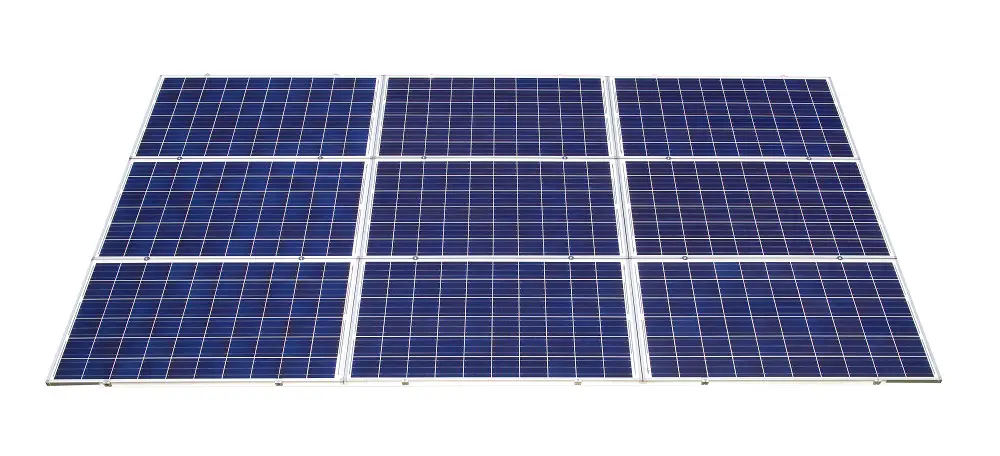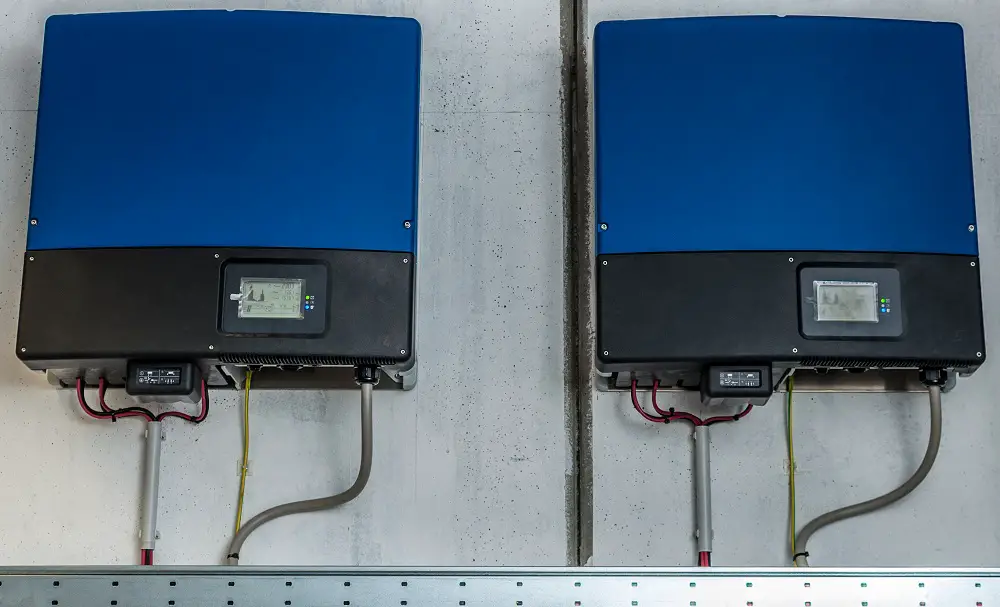Solar panels themselves make no noise; however, if the installation is second-rate, it is possible to hear some wind noise. This also applies to misshapen roofs.
The humming sound that is often associated with solar panels actually comes from the inverter; the unit that converts solar power into usable electricity.
Inverters operate at a low decibel output; users need to be relatively close to hear their gentle hum. String inverters only emit sound occasionally; even then, there are methods to combat the noise.
What is a Solar Panel?

Photovoltaic (PV) solar panels convert light from the sun and turn it into electrical energy.
A combination of photons, electrons, and silicon creates a reaction to produce a current.
Individual solar cells only produce a small amount of electricity, so they are grouped on a back sheet. A top layer of glass creates a solar panel.
Multiple panels produce higher amounts of power; therefore, several solar panels arranged together are called solar arrays.
This is the set-up frequently seen on domestic properties.
Are Solar Panels Noisy?
Generally speaking, solar panels themselves don't emit a noise; they contain no moving/mechanical parts. There are other factors related to the system that might create unwanted sound.
Installation
No part of a solar panel makes direct contact with the roof. Each one is attached to a mounting rack which, in turn, is bolted to the roof.
In rare instances, incorrect installation allows the wind to move panels that are poorly secured to the joists.
Any cable not properly pinned might also create unwanted noise.
Wind
Even well-fitted panels can suffer problems with the wind as there is a natural gap between the base of each panel and the roof. Any 'tunneling' increases if the surface is somewhat uneven.
When the wind is excessively high, it could 'catch' the edge of a panel, emitting a creaking noise as the timber forces apart. It is a rare occurrence and stops as the weather returns to normal.
Inverter

There are two types of inverters that domestic solar panels employ:
- Microinverter – Each panel has an individual inverter; they emit no noise.
- String Inverter – Commonly used on a domestic solar array. They can emit an audible hum of up to 45dB (a little louder than whisper levels).
What is a Solar Panel Inverter?
Inverters are an essential piece of equipment when harvesting energy from the sun.
They turn AC (Alternating Current) power into DC (Direct Current) power, the type used in homes to run appliances.
A string inverter is similar in size to a briefcase and usually, though not always, is attached to the side of the house.
It is the heart of the solar power system and manages the flow of power to and from the grid.
Larger inverters that cope with high levels of electrical production will run faster. As will all electrical equipment; internal fans keep components cool. When inverter speeds increase, fans rotate faster, resulting in increased noise, although still at very quiet levels.
Ask your installer about the maximum decibel level of the inverter before he/she fits it; quality inverters are usually very quiet.
Do Inverters Make Noise at Night?
Electrical production only happens in daylight; therefore, no demands are put on the inverter overnight; it remains silent.
Ways to Silence Noisy Solar Panels
You should first ascertain the type of noise you are hearing. Is it creaking or vibration; might it just be the wind?
When the noise happens, is there any noticeable reduction in production and output? If so, the solar array might not be up to the job; too few panels, highly in-demand might strain under the workload.
Speak with the installer about resolutions.
Creaking Noises
If you have ruled out any roof-related issues such as loose tiles, get the company back in to check that everything is screwed into place. Also, look for any loose connections between the strings while they're up there.
Wind
If the wind noise between the solar panels is unbearable, fit cushioning rubber panels between the roof and each one. Not only will this block the routes the wind takes, but it will also absorb any other sound and protect the integrity of the roof.
It is worth considering doing this during installation, rather than a retro-fit, particularly in high-wind regions.
Reposition the Inverter
If you're sure the noise is coming from the inverter, consider moving it further away from the places where it creates a nuisance.
Many homes utilize garage space and basements for inverters which virtually eradicates solar panel related noise.
Do Solar Farms Make noise?
As environmentally-friendly, renewable energy gains prominence, our thoughts turn to side-effects, particularly how much noise nuisance they create.
Wind power is notoriously loud; is solar power the same?
Just as domestic PV solar panels rely on inverters to generate usable electricity, so do larger assemblies that form solar farms.
The inverters have to be bigger to cope with incredibly high demand, producing significantly more noise.
However, any sound is only heard when up close, so the majority of the public is not affected. Only employees of solar farms get close enough to hear, and most likely wear personal protective equipment like ear muffs.
State laws decree that noise should only be as loud or slightly louder than the ambient surrounding sound. Solar farms sound no louder than a large air conditioning system and become less audible as distance increases.
Final Thoughts
Using solar energy to power your home not only combats air pollution by producing clean energy but also fights noise pollution.
Domestic PV panels aren't producing industrial quantities of energy. With a high-quality inverter, there is little reason for solar panels to make noise.
Solar panels are an environmentally-friendly way to power your home and save money – quietly.

